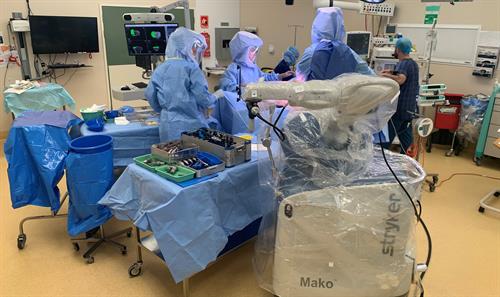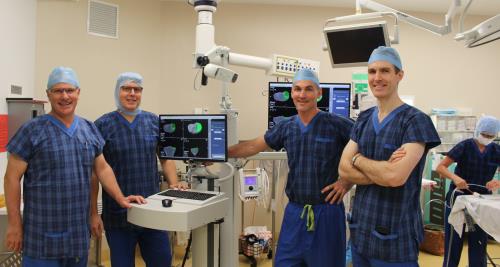500th procedure using Mako robotic technology
To celebrate 500 procedures using Mako robotic technology, in addition to ten years of Robotic Surgery at The Wesley, Dr Richard Hanly spoke about the impact of robotics on the landscape of Orthopaedic Surgery.

Dr Mark Richardson performed the 500th Mako robot case with his surgical colleagues at The Wesley on 12 October 2020.
Robotic assisted Orthopaedic surgery at The Wesley Hospital is in its infancy when reflecting on the decade of robotic surgery being celebrated by the hospital. Benchmarked as a ‘Robotic Centre of Excellence’, the addition of Robotic assisted surgery has altered the landscape of Orthopaedic surgery both locally, at The Wesley, and nationally.
Accuracy and reproducibility of outcome has driven the evolution of contemporary joint replacement surgery. With the advent of Computer Assisted Surgery (CAS), surgeons have been able to input anatomical data during joint replacement surgery with real-time feedback of range of movement and joint laxity resulting in more accurate restoration of a theoretically ideal limb alignment. Robotic assisted Orthopaedic surgery has been developed over the last 3 decades and in its current iteration represents the zenith of implant placement accuracy.
Surgeons have the ability to plan prosthesis position, size, alignment, and margin of bone resection prior to entering the operating theatre based on a 3D patient-specific model created pre-operatively. This template is then manipulated in real time during the surgery based on input of anatomical landmarks and joint kinematics. This affords the surgeon the ability to provide a truly individualised solution to joint replacement surgery.
The benefits of robotic assisted orthopaedic surgery are most evident in its use in unicompartmental knee replacement. There have been 3,068 robotically assisted unicompartmental knee replacement procedures recorded by the Australian Orthopaedic Association National Joint Replacement Registry (AOANJRR) since introduction of the technology into Australia in 2015.
In 2018, 31.8 per cent of unicompartmental knees used robotic assistance. Unicompartmental knee procedures using robotic assistance have a lower rate of revision compared to unicompartmental procedures without robotic assistance. The increased accuracy manifests as decreased revision for prosthetic loosening, progression of arthritic disease, and peri-prosthetic fracture.
The Wesley Orthopaedic and Sports Injury Clinic (WOSIC) surgeons are members of the foundation group utilising this robotic technology at The Wesley Hospital. Since installation in August 2018, there have been 395 cases performed at the Wesley Hospital using the Mako Robot with steadily increasing utilisation. It has become an invaluable teaching tool used by our team when mentoring Orthopaedic Registrars on clinical placement at The Prince Charles Hospital.
The technology has also broadened the horizon for Orthopaedic research with current work from the WOSIC group focussing on a computational model for comparison of individualised prosthesis alignment and its effect on joint kinematics.
Ultimately our patients take primacy in any medical field. In Orthopaedic surgery there has been a significant paradigm shift in this regard, with a strong focus on patient reported outcome measures (PROMs). Locally this is reflected by the implementation of the AOANJRR PROMS Pilot Study. The WOSIC group have a strong focus on Enhanced Rehabilitation After Surgery (ERAS) protocols and have implemented a comprehensive multidisciplinary pre-operative rehabilitation pathway.
The most compelling data, and likely greatest utility of Robotic Assisted Orthopaedic Surgery is in the ability to link highly accurate objective operative data to PROMs to continue to improve our patients’ surgical journey and continue to provide excellence in care and outcomes.
Dr Richard Hanly is a Lower Limb Arthroplasty, Sports and Trauma Specialist at Wesley Orthopaedic and Sports Injury Clinic.
The Wesley specialists leading the way in robotic surgery for orthopaedics:
Dr Rohan Brunello
Dr Richard Hanly
Dr Martin Lowe
Dr Paul Pincus
Dr Mark Richardson
Dr John Roe
Dr Bjorn Smith
Dr Scott Sommerville















